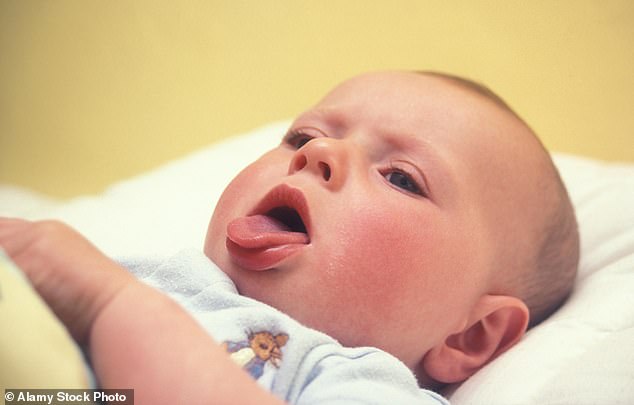Pregnant women are urged to get vaccinated against whooping cough after three more babies died from the disease in England, health officials said.
This means a total of eight babies have died from the disease since the start of the year amid a rapid rise in cases.
Since January there have been 4,793 confirmed cases of whooping cough, with one academic describing the size of the current outbreak as “alarming”.
This compares with 858 cases in all of 2023, according to figures from the UK Health Security Agency (UKHSA).
In April this year, according to the latest figures available, 1,888 cases were recorded, the highest monthly total of the year so far. The current outbreak is the largest since 2012.
The NHS recommends that all pregnant women get vaccinated against whooping cough between 16 and 32 weeks (file image)

Health officials warned that it is initially difficult to differentiate the infection from a cold, as the first signs are a runny nose and sore throat. But about a week later, patients may develop coughing fits that last minutes, have difficulty breathing after coughing, and make a “screaming” sound between coughs. Other signs of whooping cough include the passing of thick mucus that can cause vomiting and redness of the face.

Whooping cough is called the ‘100-day cough’ because of the time it can take to recover and it spreads very easily (file image)
Between January and the end of April, some 181 babies under three months old were diagnosed with whooping cough.
About half of the latest cases were in people aged 15 and older and 26 percent in children aged 10 to 14.
The bacterial infection, also known as whooping cough, affects the lungs and airways.
Whooping cough may be called the “100-day cough” because of the time it can take to recover and it spreads very easily.
Pregnant women are urged to take up the offer of the pertussis vaccine so they can pass on the protection to their babies, which should last until they are old enough to be vaccinated themselves.
Dr Gayatri Amirthalingam, consultant epidemiologist at the UK Health Security Agency, said: “Our thoughts and condolences are with those families who have so tragically lost their baby.
‘With the number of whooping cough cases across the country continuing to rise and, sadly, with infant deaths increasing in April, we are reminded once again how serious the disease can be in very young babies.
‘Pregnant women should receive the pertussis vaccine with each pregnancy, usually around the time of the mid-pregnancy scan (usually at 20 weeks).
“This passes protection to your baby in the womb so that he is protected from birth in the first months of his life, when he is most vulnerable and before he can receive his own vaccines.”
The NHS recommends that all pregnant women get vaccinated against whooping cough between 16 and 32 weeks.
Immunity from the vaccine passes through the placenta to protect newborns in their first weeks of life.
When a baby is eight weeks old they are offered the six-in-one vaccine, which includes immunization against whooping cough.
The second dose of the vaccine is offered at 12 weeks and the third at 16 weeks.
When children are three years and four months old they will be offered the four-in-one preschool booster, which protects them against whooping cough.

The government has been urged to publicize the deadly danger of whooping cough to boost vaccine uptake, as it did in the 1980s and 1990s.
Professor Sir Stephen Powis, national medical director for NHS England, said: “With pertussis cases continuing to rise sharply across the country and current UKHSA figures sadly showing more child deaths, it is vital that families come forward. to get the protection they need. need.’
UKHSA said the first signs of whooping cough are similar to those of a cold, such as a runny nose and sore throat, but after about a week, the infection can develop into coughing fits that last a few minutes and are usually worse at night. .
Young babies may also make a distinctive “cry” or have difficulty breathing after a coughing fit, although not all babies make this noise, meaning whooping cough may be difficult to recognize.
Professor Andrew Preston, from the University of Bath, said: “It is unknown when the current outbreak will peak, cases have risen steadily since late last year.
‘In particular, each month of 2024 has seen more cases than recorded in any month since before 2018.
“While an increase in cases was expected as other respiratory infections have recovered from the very low levels seen during the pandemic, the magnitude of the current outbreak is alarming.
“As cases continue to increase, it indicates that circulation among the population of the causative bacteria, Bordetella pertussis, is increasing, posing an even greater risk of infection.”


